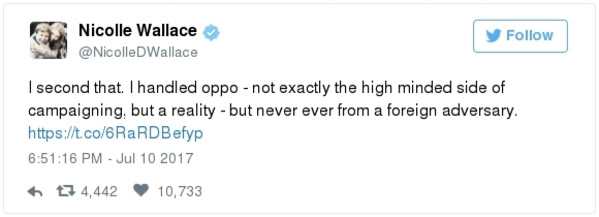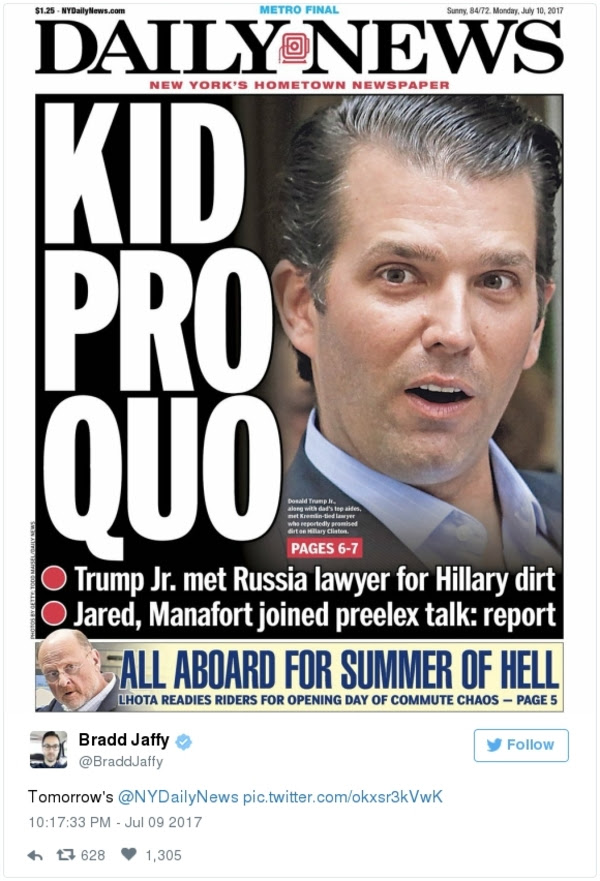 |
| CreditWilliam Campbell/Corbis, via Getty Images |
Last night,
the New York Times reported: “
Before arranging a meeting with a Kremlin-connected Russian lawyer he believed would offer him compromising information about Hillary Clinton, Donald Trump Jr. was informed in an email that the material was part of a Russian government effort to aid his father’s candidacy, according to three people with knowledge of the email. The email to the younger Mr. Trump was sent by Rob Goldstone, a publicist and former British tabloid reporter who helped broker the June 2016 meeting. In a statement on Sunday, Mr. Trump acknowledged that he was interested in receiving damaging information about Mrs. Clinton, but gave no indication that he thought the lawyer might have been a Kremlin proxy. Mr. Goldstone’s message, as described to The New York Times by the three people, indicates that the Russian government was the source of the potentially damaging information."
 |
| The pop star at the center of the latest Russia controversy |
New details from others involved in arranging the meeting point to additional Trump links to Moscow. Our Rosalind S. Helderman, Tom Hamburger and Greg Miller report: “The session was set up at the request of Emin Agalarov, a Russian pop star whose Kremlin-connected family has done business with Trump in the past … Emin Agalarov and his father, Aras Agalarov, a wealthy Moscow real estate developer, helped sponsor the Miss Universe pageant, then owned by Trump, in Russia in 2013. After the pageant, the Agalarovs signed a preliminary deal with Trump to build a tower bearing his name in Moscow, though the deal has been on hold since Trump started his campaign for president. ...
“Goldstone previously told The Washington Post that he set up and attended the meeting so Veselnitskaya could discuss the adoption of Russian children by Americans. In a new statement, Goldstone confirmed what Trump Jr. said Sunday: that he enticed the then-candidate’s son by indicating that (Natalia) Veselnitskaya could provide damaging information about Democrats …
“
The involvement of the Agalarovs brings the meeting closer to Trump’s past business interests and to the Kremlin. Trump has spent time with both Emin Agalarov and his father —
appearing in a music video for the pop singer that was filmed at the Moscow Ritz-Carlton hotel in 2013. … The Agalarovs are also close to Russian President Vladimir Putin. Aras Agalarov’s company has been awarded several large state building contracts, and shortly after the 2013 pageant, Putin awarded the elder Agalarov the ‘Order of Honor of the Russian Federation,’ a prestigious designation.”
-- Trump Jr., 39, has hired criminal defense lawyer Alan Futerfas to represent him in the Russia probes. His past clients have included alleged organized-crime associates. In a statement sent late last night, the New York-based attorney neither confirmed nor denied the Times story about the email on Russia’s intentions. He called the June meeting “much ado about nothing” and said Trump Jr. believed he was being offered information about “alleged wrongdoing” by Clinton in her dealings with Russia. “Don Jr.’s takeaway from this communication was that someone had information potentially helpful to the campaign and it was coming from someone he knew,” he said.
-- Susan Hennessey, the managing editor of Lawfare and a Brookings Fellow, drops a truth bomb. A Harvard Law graduate, she was previously an attorney in the general counsel’s office at the National Security Agency:
 |
-- Eugene Robinson calls the Russia meeting “a legal game-changer”: “From now on, ignore the conventional wisdom about how the Russia scandal is not ‘resonating’ with President Trump’s still-loyal base. The question at this point is what strikes a chord with special counsel Robert S. Mueller III — and what kind of legal jeopardy Trump’s closest associates, including his eldest son and son-in-law, might eventually face. … Is this all too complicated for voters to follow? Would Americans beyond the Beltway rather hear about jobs or health care? Perhaps so. But the questions that should be concentrating the minds of the president’s inner circle are legal, not political — and Mueller’s high-powered team of lawyers is experienced at connecting dots.”
-- “This is a very simple test of the common English understanding of the term ‘collusion,’” New York Magazine’s Jonathan Chait writes. “Your campaign is told that Russia wants to help you win the election. If you refuse to take the meeting, or perhaps take it only to angrily tell your interlocutor you want no part … then it isn’t collusion. If you take the meeting on the proposed terms, you are colluding. If somehow the information on offer turned out to have no value … then the meeting was ineffectual collusion. But Donald Trump Jr.’s response clearly indicates that he accepted the meeting in order to collude. The most sinister versions of the collusion scenario have been treated as unlikely or paranoid hypotheses. But it is the explanation most consistent with distinct sleaziness that defines Trump … To imagine that [he] might have had the chance to benefit politically from Russian espionage, and turned it down out of a sense of responsibility, is the unlikeliest scenario of all.”
[here's the bar for collusion (which is actually a political, not legal, term): You can't accept any gift from a foreign government, and you can't knowingly conspire with a foreign government to undermine the election. If you do, you could be convicted of conspiracy to work with a foreign adversary or election fraud.]
 |
| Warner calls news of Trump son's meeting with Russia lawyer 'remarkable' |
-- Don Jr. must also contend with the ongoing congressional investigations. A Republican senator on the Intelligence committee, Susan Collins of Maine, said the panel “needs to interview” the president’s namesake and the others who attended the meeting. Sen. Mark R. Warner (D-Va.), the vice chairman of the committee, gaggled outside his office yesterday afternoon to explain the significance of the latest revelation: “This is the first time the public has seen clear evidence that senior-level officials of the Trump campaign met with potentially an agent of a foreign government to try to obtain information that would discredit Hillary Clinton,” he said.
 |
| Huckabee Sanders plays down Trump son's meeting with Russian lawyer |
-- What did the president know and when did he know it? Administration officials, who spent months vehemently and categorically denying that there was any contact between the campaign and Russians, are now trying to downplay the significance of an encounter that undercuts many of their previous claims.
White House spokeswoman Sarah Huckabee Sanders claimed during her off-camera briefing that the president only learned of his son’s meeting with Veselnitskaya “in the last couple of days.” Don Jr. also said in his Sunday statement that his father “knew nothing of the meeting or these events.”
This is very hard to believe. Don Jr. pulled in his brother-in-law, Jared Kushner, and campaign chairman Paul Manafort. “This was three people who were closer to him and to the campaign than just about anybody else,”
Aaron Blake explains. “This meeting was seen as significant enough for all three of them to make a point to attend, and yet nobody shared details of the meeting with the guy whose campaign they were acting as members of? The president is going to have to address this.”
Why has the White House failed to get its story straight on so many occasions? “When you are treading water in situations like these, the best strategy is generally to get all the bad news out at once, and to understand the truth so that you don't keep getting caught in falsehoods that make it look like you have something to hide,”
Aaron writes. “There are basically two options for the White House officials here: They are trying to hide something, or they are completely derelict in dealing with — and getting out in front of — all of this.”
-- John Wagner and Ros Helderman quickly turned a good profile of Don Jr.: “As an executive in his father’s company, Trump Jr. was active in pursuing Trump Organization business prospects in Russia. He traveled to Moscow along with Ivanka Trump in 2006 and also helped pitch Trump-branded real estate to Russians. ‘Russians make up a pretty disproportionate cross-section of a lot of our assets,’ Trump Jr. told a real estate conference in 2008, according to a trade publication. ‘We see a lot of money pouring in from Russia.’ In the speech, he said he had traveled to Russia half a dozen times in the previous 18 months. In October 2016, just weeks before his father’s election, Trump Jr. delivered a paid speech in Paris to a group whose leaders are close to Russia.”
 |
| Nominee for FBI Director Christopher Wray. Saul Loeb/AFP/Getty Images |
The Post’s Editorial Board says the latest news further raises the stakes for FBI nominee Chris Wray’s confirmation hearing tomorrow: “The latest revelations only intensify the questions surrounding Mr. Trump’s firing of FBI Director James B. Comey after Mr. Comey, according to his own testimony, declined to pledge personal loyalty to the president. They also intensify the urgency of a careful Senate vetting of Mr. Trump’s nominee to replace Mr. Comey, Christopher Wray, who will testify before the Senate Judiciary Committee on Wednesday.
Mr. Wray must commit to the independence of the FBI by detailing any conversations he had with Mr. Trump, and in particular whether the president asked him for his loyalty. He must be able to say that he made no such commitment. And he must promise that he will do everything to cooperate with, and nothing to impede, the special counsel’s Russia investigation.”

Donald Jr. speaks at last summer's Republican National Convention in Cleveland. (Brian Snyder/Reuters)
-- More than ever, a Russia sanctions bill that’s floundering in the House is becoming a test of congressional will to stop Trump from continuing to cozy up to Putin. “Popular legislation that would limit President Trump’s ability to lift financial sanctions on Russia is mired in a partisan dispute in the House, with Democrats charging that a recent change would weaken the bill,”
Karoun Demirjian and Mike DeBonis report this morning. “The pending legislation, which passed the Senate on a 98-to-2 vote last month, is effectively a congressional check on Trump: any time the president wants to make a change to sanctions policy on Russia, lawmakers would have a chance to block him. House Democrats said they do not trust that House GOP leaders are serious about the effort — and are now worried a recent change to the bill would effectively rob them of their ability to raise objections to Trump’s Russia sanctions moves in the future.”
The state of play: “(Speaker Paul) Ryan has spoken in favor of the Senate sanctions bill but has not specifically pledged to bring it to the House floor intact, deferring instead to the House committees with jurisdiction over the matter. House Majority Leader Kevin McCarthy (R-Calif.), who is close to the president, has also officially deferred to the committees. House Foreign Affairs Committee Chairman Edward R. Royce (R-Calif.) is in favor of holding a floor vote soon.”
-- How cable commentators are talking about the NYT email news:
-- Three alumni of George W. Bush's presidential campaigns pushed back on the White House's talking point that Don Jr.'s meeting was no big deal:





/cdn.vox-cdn.com/uploads/chorus_image/image/55764645/GettyImages_817900308.0.jpg)



















